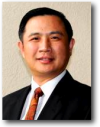Seminar Speaker
Social Computing and Its Application in Query Suggestion
Irwin King
Department of Computer Science and Engineering
The Chinese University of Hong Kong
- Date: Monday, April 5, 2010
- Time: 10:10 am
- Venue: Room 119, EngBldg 9, The University of Tokyo [ Map ]
Abstract
The Web has transformed the landscape on how humans interact socially. With the advent of Web 2.0, Social Computing has emerged as a new and innovative paradigm that changes the way we communicate, interact, and learn. Social Computing involves the investigation of collective intelligence by using computational techniques such as machine learning, data mining, natural language processing, etc. on social behavioral data collected from blogs, wikis, emails, instant messages, clickthrough data, query logs, social bookmarks, tags, etc. In this talk, I will first introduce Social Computing by outlining some of the unique characteristics and aspects that are found on the various social platforms. In the second part, I present an application in query suggestion since most of the current query suggestion algorithms suffer from the problem of poor recommendation accuracy. Aiming at providing semantically relevant queries for users, we outline a novel, effective and efficient two-level query suggestion model by mining clickthrough data, in the form of two bipartite graphs (user-query and query-URL bipartite graphs) extracted from the clickthrough data. We propose a joint matrix factorization method which utilizes two bipartite graphs to learn the low-rank query latent feature space, and then build a query similarity graph based on the features. We then use an online ranking algorithm to propagate similarities on the query similarity graph that computes latent semantically relevant queries to users. Lastly, I will conclude with some current challenges and potential future promises of Social Computing.
Brief Profile
Dr. King's research interests include machine learning, web intelligence, social computing, data mining, and multimedia information processing. In these research areas, he has over 200 technical publications in journals (JMLR, ACM TOIS, IEEE TNN, Neurocomputing, NN, IEEE BME, PR, IEEE SMC, JAMC, JASIST, IJPRAI, DSS, etc.) and conferences (NIPS, IJCAI, CIKM, SIGIR, KDD, PAKDD, ICDM, WWW, WI/IAT, WCCI, IJCNN, ICONIP, ICDAR, etc.). In addition, he has contributed over 20 book chapters and edited volumes. Moreover, Dr. King has over 30 research and applied grants. One notable patented system he has developed is the VeriGuide System, previously known as the CUPIDE (Chinese University Plagiarism IDentification Engine) system, which detects similar sentences and performs readability analysis of text-based documents in both English and in Chinese to promote academic integrity and honesty.
Dr. King is an Associate Editor of the IEEE Transactions on Neural Networks (TNN) and IEEE Computational Intelligence Magazine (CIM). He is a member of the Editorial Board of the Open Information Systems Journal, Journal of Nonlinear Analysis and Applied Mathematics, and Neural Information Processing–Letters and Reviews Journal (NIP-LR). He has also served as Special Issue Guest Editor for Neurocomputing, International Journal of Intelligent Computing and Cybernetics (IJICC), Journal of Intelligent Information Systems (JIIS), and International Journal of Computational Intelligent Research (IJCIR). He is a senior member of IEEE and a member of ACM, International Neural Network Society (INNS), and Asian Pacific Neural Network Assembly (APNNA). Currently, he is serving the Neural Network Technical Committee (NNTC) and the Data Mining Technical Committee under the IEEE Computational Intelligence Society (formerly the IEEE Neural Network Society). He is also a member of the Board of Governors of INNS and a Vice-President and Governing Board Member of APNNA.
Dr. King joined the Chinese University of Hong Kong in 1993. He received his B.Sc. degree in Engineering and Applied Science from California Institute of Technology, Pasadena and his M.Sc. and Ph.D. degree in Computer Science from the University of Southern California, Los Angeles.


